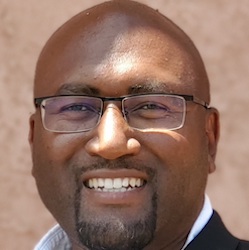
The University Library is pleased to announce the awardee of the Visualizing Abolition Artist in the Archive Residency for the 2022-2023 academic year: Ontario Alexander.
Ontario Alexander (he/him) is a Cross-Cultural Musicology Ph.D. student at the University of California, Santa Cruz. His area of study includes historical musicology in the French Baroque period and the roles of colonial history and theory in music. Other areas of interest include African American Black music history and social theory of music concerning the developments of gospel, blues, and jazz music as acts of political resistance, struggles for freedom, and cultural affirmation. Alexander holds an M.A. in Vocal Performance and an M.B.A. from California State University, Los Angeles, and a B.A. in Theater from Louisiana State University, Baton Rouge. As a multidisciplinary artist, he integrates his art practice into his research.
The Visualizing Abolition Artist in the Archive Residency fosters creative research and experiential learning about prisons, policing, and the movement for abolition through archival engagements with UC Santa Cruz University Library Special Collections & Archives. Created in partnership with the Mellon Foundation funded Visualizing Abolition public scholarship initiative, the Archive Residency Program offers a one-year stipend and research support for a graduate student artist to engage with unique primary materials in Special Collections & Archives and examine the University’s role in police and prison abolition, critique dominant historical narratives and archival silences, and/or explore connections between art, history, and social justice.
This program supports the goal of the Visualizing Abolition initiative: to shift the social attachment to prisons through art and education. Additionally, it is in alignment with the University Library goal of student success by providing an opportunity for experiential learning, and to present research and works-in-progress associated with the Library. This is the first year of this residency program, and is therefore being approached as a pilot project intended to explore the possibilities of collaborative programming in this area.

 RSS Feed
RSS Feed Santa Cruz, CA
Santa Cruz, CA



